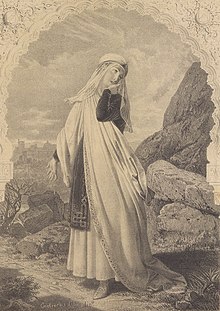This article includes a list of general references, but it lacks sufficient corresponding inline citations. Please help to improve this article by introducing more precise citations. (January 2023) (Learn how and when to remove this message)
|
Aisha al-Hurra (Arabic: عائشة الحرة), generally known under her Spanish name Aixa (fl. 1493), was an Arabian Princess of the Nasrid dynasty. She was the spouse of Muhammed XI and of Abu l-Hasan Ali, and the mother of Muhammad XII. She was politically active and exerted influence upon the policy of state during the last years of the Emirate of Granada. Aixa is one of the best known women of the history of the Emirate of Granada.

Aixa was also known by the Muslims as Aisha al-Horra; "al-Horra" being a noble title (meaning "Free Woman")[1][2] due to the fact that she was one of the living descendants of Muhammed.
Aixa was born a member of the ruling Nasrid dynasty of Granada, likely the daughter of Muhammed IX.
She personally owned several palaces and properties. The Nasrid princesses had control over their own property (dowry) in accordance with Islamic law and were free to dispose of it as they pleased, provided they continued to observe their harem seclusion.[3]
The princes of the Nasrid dynasty could have many slave concubines, but normally only married members of the Nasrid dynasty to benefit dynastic legitimacy, forge alliances between different family fractions and keep royal property in the family.[4] Aixa was first married to Muhammed XI; after his death in 1455, she was married by his successor Said to his heir, Abu l-Hasan Ali. Her second marriage was likely an attempt to make peace between the rival factions of the dynasty. Aixa was exiled to another palace with her sons after her spouse fell in love with his Christian slave Isabel de Solís and married her.
In 1482, Aixa allied herself with the opposition party Abencerrages and had her husband deposed in favour of her son Muhammed XII, also known as Boabdil. Aixa was politically active during the reign of her son. She is said to have prevented harassment of the Christians in Granada[citation needed]. In 1483, she handled the negotiations for the release of her son, who had been taken captive by Castile.
Aixa was known to be an extreme patriot, since she wanted to continue to fight to the death using women, children, and old men, even though the army of Granada was defeated by Ferdinand and Isabella of Castile and Aragon. She blamed the defeat on traitors in the kingdom who allowed themselves to betray their country for large sums of money and property if they would convince their king to surrender the Kingdom of Granada.
After the fall of Granada in 1492, she followed her son into exile—first to Alpujarras, and in 1493 to Fes.
A famous legend says that when her deposed son Muhammad XII left Granada after its fall, he looked back upon it and sighed. Aixa then replied: